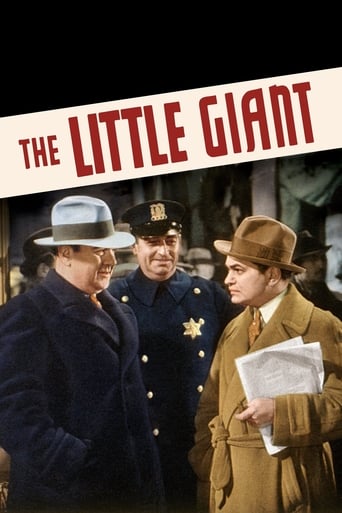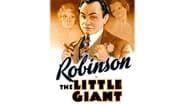bkoganbing
Edward G. Robinson who would occasionally channel his gangster image into comedy roles does it for the first time here in The Little Giant. He plays a gangster from Chicago named James Ahern aka Bugs Ahern who has seen the end of Prohibition and has wisely salted away his money. Wanting a little class and wanting to mix with the upper crust he moves to Santa Barbara and starts mixing.Unfortunately he mixes with a family of society crooks father Berton Churchill, mother Louise Mackintosh, son Donald Dillaway. Worst of all he falls for Helen Vinson playing one of her patented bad girl roles who is a notorious flirt. Robinson has rented a mansion from down on her luck society girl Mary Astor who along with thousands of others had her savings wiped out by investing in the junk bonds that Churchill's firm sold. And now he's sold the firm to Robinson.No one makes a sucker out of Robinson and he settles the matter with some friends imported from back east who do it Chicago style. The real Bugs Moran would never have been this gentle as Robinson's old beer salesmen were in The Little Giant.Robinson got deserved kudos for essaying comedy and he would do it many times in his career. You have to see how he and his friends play polo Chicago style.A must for fans of Edward G. Robinson.
mark.waltz
Prohibition has come to an end, and just as fast as Kevin Costner's Elliot Ness was ready to go get a drink, bootlegger Edward G. Robinson is ready to become respectable. He doesn't plan on getting hoodwinked by a bunch of "fags", he says, referring to the wealthy people of Santa Barbara in that term to indicate "well-dressed swells", not cigarettes, bundles of sticks or gay men. This is a sassy pre-code comedy of the snobs versus the slobs, where Chicago meets California elite, where manners meet muscatel. Along the way, Robinson rents a huge mansion from the pretty but broke Mary Astor who hires her former servants out to him but begs their confidentiality in order to pay off back taxes. As for the wealthy family who gets him involved in a business scheme, there's the fickle Helen Vinson, a socialite with candied lips but an acid tongue, pompous father Berton Churchill, horse-faced mother Louise Mackintosh (whom I whinny at every time I see her) and good for nothing brother Don Dillaway. It is clear from the beginning that Astor is more the one to teach Robinson the real meaning of good breeding, and it is also apparent that Robinson will utilize his band of merry dumbbells from Chicago to seek revenge on the family who underestimated his lack of sophistication.This is delightful pre-code comedy, with shots of the reformed mobsters attempting to play polo, and much witty dialog to boot as Robinson tries to fit in an element that perhaps he was better avoiding. He gets to learn that all so-called "decent" people aren't necessarily "nice" people and they find out that he isn't above resorting to old methods in order to cinch a business deal. Churchill, it seems, is bilking clients with worthless stock, and when Robinson gets involved, he is the one left holding the bag. But big business for him is just like his was during the depression, and after a memorable opening where he expresses his fury towards FDR for ruining his business. The cops who used to try to catch him smuggling his illegal beer now jeer him for being a has-been so he sets off to prove he can be legitimate. This gives Robinson a lot of juicy material to handle and two beautiful if different leading ladies to play off of. That makes this one of those pre-code films that remains entertaining and historically interesting, although his Bugs is certainly not as threatening as his Rico was in "Little Caesar".
Michael_Elliott
Little Giant, The (1933) *** (out of 4) When F.D.R. gets elected President, Chicago bootlegger Bugs Ahearn (Edward G. Robinson) decides to get out of the business. He heads off to California where he plans on crashing into society and he thinks he's doing a good job but he doesn't realize that his love (Helen Vinson) is actually from a corrupt family that is just using him. THE LITTLE GIANT isn't a perfect movie and it's not really that funny either but it's impossible not to fall for its charm and especially the charm of Robinson. Most people will always remember Robinson for his tough guy roles but if you dig deeper into his filmmography you will see that he was actually able to play just about any type of character. This film is without question a spoof of his tough image but it works so well because you can believe Robinson in the part of the gangster but also believe him in the sillier stuff where he's trying to be a gentleman. There are some very good moments scattered throughout the film but I think the real highlight is in the final ten-minutes once Robinson realizes what has happened and he decides to bring a little Chicago out West. Vinson is also very good in her supporting role as she has no problem playing this brat and we get nice work from Russell Hopton and Kenneth Thomson. Mary Astor is also extremely charming as the woman who falls for Robinson, although he doesn't know it at first. Both actors are so good together that the film actually drags a bit when they're not together. Fans of Robinson or the Warner gangster pictures are certainly going to want to check this out just to see the studio and star spoofing themselves.
theowinthrop
It is generally conceded that Edward G. Robinson (his memoirs tell us that the "G" was for "Gould", but it was a made-up name, so he just left it a "G") was one of the finest actors in Hollywood history, who repeatedly missed out on deserved "Oscar" recognition, although he did get a career "Oscar" shortly before his death in 1971. But most of the performances he is best recalled for ("Little Caesar", "Double Indemnity", "The Ten Commandments", "Dr. Ehrlich's Magic Bullet", "The Sea Wolf", "Key Largo", "The Woman In The Window", "All My Sons") were dramatic parts. In fact, many were outright villains. He did play comedy, and when the film was intelligent it was usually with good results. In particular his gangster comedies, "A Slight Case of Murder", "Larceny, Inc.", and "The Whole Town is Talking", show him to best effect. And there is this early comedy (I believe it was Robinson's first comic turn).Bugs Ahearn is like Remy Marko in "A Slight Case of Murder". Both are beer baron racketeers from the 1920s and early 1930s, who have made a pile, but face the end of "prohibition" by trying to turn legit - or as close to legit as possible. Remy (sticking to the New York Metropolitan area) decided to continue his brewery as a competitor with now other legitimate beer companies, not realizing (until it's almost too late) how dreadful his swill tastes. Bugs decides he's made enough, pulls up stakes and heads for the West Coast. He will now try to join the "beautiful people" in high society. But while Remy has his loyal gang members and his wife and daughter to support him, Bugs goes it alone. And is taken to the cleaners.I don't think that the view of the rich that appear in these films (and other gangster films of the 1930s) would be as dark again until the last ten years. Although some of the film noir movies showed a seedy side to the wealthy and prominent (notably in those films based on Raymond Chandler and Dashiel Hammett novels), the films of the last decade made in the wake of scandals like EXXON, certainly made the bulk of the public question the rich. In 1933 the same serious questioning was going on. Economic heroes of the 1920s like Michael Meehan, Jesse Livermore, William C. Durant, Samuel Insull, and Richard Whitney became criminals or pariahs in the 1930s as investigations revealed their thefts or skirting of the laws. Even J.P. Morgan 2nd (an uncle of Whitney by marriage) was shown to have made a "mistake" in underestimating his income tax in the early 1930s. Comparatively speaking, gangsters like Remy or Bugs were more openly criminal than their white collar counterparts - who stole millions from small investors, and did not break laws to service a need for mild alcoholic beverages. So it was easy to side with Bugs or Remy when they face these secret villains - like the rest of the population did.Except for former wealthy woman Mary Astor, who finds she likes Bugs, all of the wealthy people in this film are parasites who see Bugs as dirt to use to get rid of worthless stock before they are left holding the bag. The choice of Burton Churchill as the head of the Cass family, as unctuous a villain in the 1930s as you could find, was perfect. His respectable demeanor hiding a wolf-like passion for money at the expense of the gullible - here Bugs, who is smitten by Churchill's equally villainous daughter Helen Vinson.At the end of "A Slight Case Of Murder" Remy found out the error of his beastly beer brew, and snookered the white collared villains (bankers) into giving his loan an extension while he found a new beer formula that worked. Here the ending is more satisfactory, with Bugs asking his pals from Chicago to assist him, and forcing Churchill and his confederates to buy back the worthless stock. The scenes of this were very satisfying to depression America audiences.




